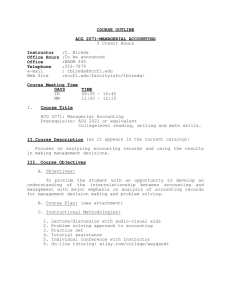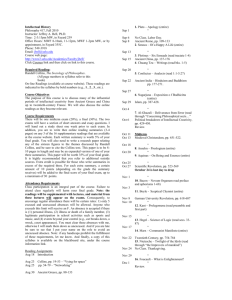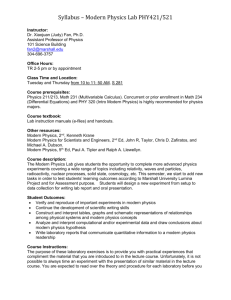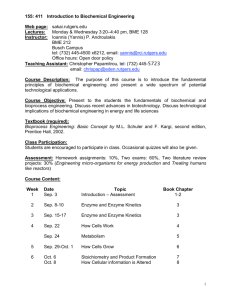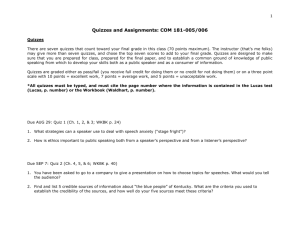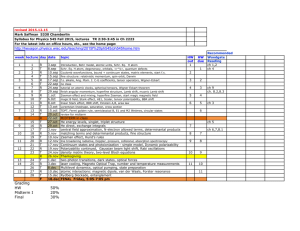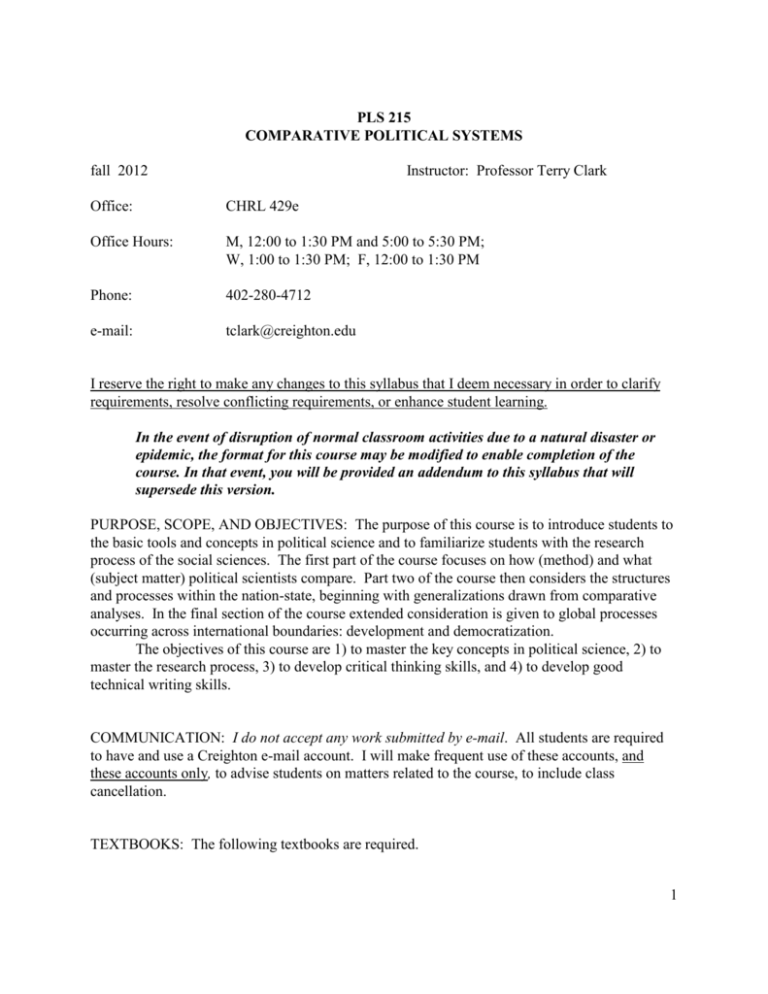
PLS 215
COMPARATIVE POLITICAL SYSTEMS
fall 2012
Instructor: Professor Terry Clark
Office:
CHRL 429e
Office Hours:
M, 12:00 to 1:30 PM and 5:00 to 5:30 PM;
W, 1:00 to 1:30 PM; F, 12:00 to 1:30 PM
Phone:
402-280-4712
e-mail:
tclark@creighton.edu
I reserve the right to make any changes to this syllabus that I deem necessary in order to clarify
requirements, resolve conflicting requirements, or enhance student learning.
In the event of disruption of normal classroom activities due to a natural disaster or
epidemic, the format for this course may be modified to enable completion of the
course. In that event, you will be provided an addendum to this syllabus that will
supersede this version.
PURPOSE, SCOPE, AND OBJECTIVES: The purpose of this course is to introduce students to
the basic tools and concepts in political science and to familiarize students with the research
process of the social sciences. The first part of the course focuses on how (method) and what
(subject matter) political scientists compare. Part two of the course then considers the structures
and processes within the nation-state, beginning with generalizations drawn from comparative
analyses. In the final section of the course extended consideration is given to global processes
occurring across international boundaries: development and democratization.
The objectives of this course are 1) to master the key concepts in political science, 2) to
master the research process, 3) to develop critical thinking skills, and 4) to develop good
technical writing skills.
COMMUNICATION: I do not accept any work submitted by e-mail. All students are required
to have and use a Creighton e-mail account. I will make frequent use of these accounts, and
these accounts only, to advise students on matters related to the course, to include class
cancellation.
TEXTBOOKS: The following textbooks are required.
1
Almond, Gabriel A., G. Bingham Powell, Jr., Kaare Strom, and Russell J. Dalton.
Comparative Politics: A Theoretical Framework. 5th ed. NY: Pearson Longman, 2004.
(APSD)
Clark, Terry D. Beyond Post-Communist Studies: Political Science and the New Democracies of
Europe. Armonk, NY: M.E. Sharpe, Inc., 2002. (TDC)
Sodaro, Michael J. Comparative Politics: A Global Introduction. 3rd ed. Boston: McGraw-Hill,
2004. (S)
EVALUATION: You will be evaluated on the basis of three (3) hourly examinations, a research
proposal, and several unannounced quizzes. The weight for each component is as follows.
Please note that I do not accept any work submitted by e-mail.
1st and 3rd examinations
15% each =
30%
2nd examination
20%
research proposal
40%
unannounced quizzes
10%
Points for each requirement will be assigned from 0 to 100. The final course grade will
be determined on the basis of the weight for each assignment and the following scale.
93 to 100
88 to 92
83 to 87
78 to 82
70 to 77
60 to 69
below 60
A
B+
B
C+
C
D
F
Class Attendance, Absences, and Participation: Unless you inform me in advance of the reason
for an absence, you will be given an unexcused absence. Excused absences are only given for
illness, family emergencies, or University sponsored events. I retain the right to determine what
constitutes an excused absence. You will be penalized one full point on your final grade for
every unexcused absence over a limit of three. I do not offer make-ups for quizzes or exams
missed owing to an unexcused absence. Should you miss a quiz or an exam as a result of an
unexcused absence or without having informed me of the reason for the absence in advance, you
fail the quiz or exam.
2
Readings for the course are listed in the assignment section of this syllabus. Please, read
the assigned materials before each scheduled class. In the expectation that you have done so, I
will feel free to call upon students to respond to questions based on the readings. Even if I do not
call on you, you should make sure that you read and comprehend the assignments since I do not
intend to lecture "from the book." Instead, I will use the readings as a "springboard" for the day's
lecture.
Unannounced Quizzes: As a further incentive for you to read and participate in class, there will
be several unannounced quizzes during the semester. The quizzes are designed to test your
understanding of the basic ideas and concepts introduced in the assigned readings before they are
discussed in class. However, quizzes may also cover previously discussed materials. They will
be worth 10% of the final grade. There will be no make-up quizzes. Unless you have an
appropriate excuse, you will receive a zero for each quiz missed.
Research Proposal: You will prepare a research proposal, typewritten and double-spaced, for
submission on December 7. Prior to the final submission date, you will submit drafts of sections
of the proposal for grade. (The first draft of the research question is due September 24, the first
draft of the literature review section is due October 1, and the first draft of the hypothesis and
theory section is due October 8.) The drafts may be resubmitted for grade until November 19. I
do not accept either drafts or the final proposal by e-mail. The following schema contains the
sections of a research proposal and is provided as guidance.
1. Research Question: Identify the central question that your proposal intends to answer. The
question must be formulated so as to seek a cause for a particular political phenomenon. Why
does it occur in one set of nation-states and not in another? Define all your key terms, scope the
question (indicate the date and geographic context), and argue why the question is an important
one. Conclude by identifying your hypothesis and giving a brief synopsis (executive summary)
of the theory.
2. Literature Review: Identify how many hypotheses have been proposed to answer your
question and label them. Discuss each hypothesis in order in which they were identified.
Conclude by identifying your proposal's hypothesis along with a justification for doing so.
3. Hypothesis and Theory: Identify your proposal's hypothesis and define the independent
variable. Fully discuss the logical link leading from cause to effect (the theory behind your
hypothesis
4. Footnotes and Bibliography: You must cite all sources. The style for both citations and the
bibliography is found in The Chicago Manual of Style. Do not rely on a single source addressing
your issue; make sure that the analysis is yours. Your bibliography must contain at least ten
books and articles. No internet sources that are not also available in print (i.e., as articles in
professional journals) may be included. Should you need help in identifying sources, do not
hesitate to ask me for assistance.
3
The final grade for the research proposal will be the average of the draft sections (onethird of the grade) and the final submission (two-thirds of the grade). When calculating the grade
for the draft sections, I will add the highest grade received on the submissions for each of the
three sections and divide by three. The following scale will be used in determining the grade for
final submission of the research proposal.
Style:
Grammar
Clarity
10 points
10 points
Content:
Research Question
20 points
Literature Review
20 points
Hypothesis and Theory
30 points
Bibliography and Citations
10 points
Late Submission Policy: I do not accept late submissions of exams or the final draft of the
proposal.
Unless properly justified well in advance of the exam, I do not offer make-ups for in-class
exams. Should you miss an exam without a proper reason, of which you inform me well in
advance, you fail the exam.
ACADEMIC HONESTY: All work that you submit must be your own, and all sources must be
properly cited. The purchase of "research service" papers, plagiarism, resubmission of prior
work, obstructing the work of others, misuse or abuse of library or computer resources or any
form of misrepresentation in gathering or presenting data constitute academic dishonesty. While I
do not expect anyone to engage in such practices, should you do so, you will receive an "F" for
the course.
Suspected cases of academic dishonesty will be reported to the Dean's office and
managed according to the College of Arts and Sciences academic honesty guidelines
(http://puffin.creighton.edu/ccas/FacStaff/polManual/polManual.htm). Grounds for investigating
papers for this will include, but will not be limited to my judgement that work is not responsive
to the assignment, a discrepancy of more than one letter grade separating a paper from prior
work submitted by the student, or my evaluation that the paper reflects knowledge and/or writing
styles not usually available to undergraduate students.
OFFICE HOURS: Let me encourage you to visit with me to discuss any problems you are
having with the materials or course assignments. Do not wait until the last minute to seek advice
4
or assistance. You may well find that my calendar is full. My office hours are on the first page
of this syllabus. You may also reach me by e-mail or by phone (402-280-4712).
ASSIGNMENTS: Unless otherwise noted, assigned readings are to be read by the first day of
the lesson.
Topic
Dates
Reading Assignment
Key Terms
Aug 22
S, 124-132, 147-153, 194-205
(Key terms)
British Political System
Aug 24-27
S, 395-443
S, 498-549 (Germany, due Aug 27)
French Political System
Aug 29-31
S, 444-497
S, 550-592 (Japan, due Aug 31)
No Class
Sep 3
Labor Day
Democracy
Sep 5
S, 171-193
A Framework for Comparison
Sep 7
APSD, 38-55
Comparative Politics
and Political Science
Sep 10
S, 3-59
An Art or a Science?
Sep 12
S, 60-97
Thesis Writing (Research Questions) Sep 14
1st Exam
none
Sep 17
Thesis Writing (Literature Reviews) Sep 19
none
Library Systems
Class meets at the Library
Sep 21
FIRST DRAFT OF RESEARCH QUESTION SECTION DUE - September 24
Thesis Writing (Hypotheses and
Theories)
Sep 24-26
None
S, 702-733 (Mexico, due Sep 26)
Behavioralism: Political Culture
Sep 28
APSD, 56-78
S, 293-311
5
FIRST DRAFT OF LITERATURE REVIEW SECTION DUE – October 1
Political Behavior: Recruitment
and Elites
Oct 1
APSD, 151-159
S, 98-123
Political Behavior: Groups
and Interest Articulation
Oct 3-5
APSD, 79-104
S, 280-284
FIRST DRAFT OF HYPOTHESIS AND THEORY SECTION DUE – October 8
Ideology and Constitutions
Oct 8
Rational Choice Theory
Oct 10-12
S, 312-341
S, 128-146
APSD, 133-146
TDC, 108-110, 84-102
No Class
Oct 13-22
Spring Break
New Institutionalism
Oct 24-26
TDC, 102-127
Institutions: Party Systems
and Elections
Oct 29-31
APSD, 102-126
S, 270-280
S, 205-220
Institutions: Legislatures
Nov 2-5
APSD, 146-151
S, 128-132, 194-205
S, 762-783 (Nigeria, Nov 5)
Institutions: Executives and the
Judiciary
Nov 7-9
APSD, 151-159
S, 194-220 (review)
Institutions: the Bureaucracy
Nov 12-14
APSD, 159-167
APSD, 168-200
2nd Examination
Nov 16
LAST DAY TO SUBMIT DRAFT SECTIONS OF THE RESEARCH PROPOSAL –
November 19
Development and
Modernization
Nov 19-Nov 30
S, 342-365
S, 366-391
No Class
Nov 21-25
Thanksgiving
6
Democratization
Dec 3-7
S, 221-241
RESEARCH PROPOSAL DUE – December 7
FINAL EXAMINATION – 10:00 to 11:40 AM, Friday, December 14
7



